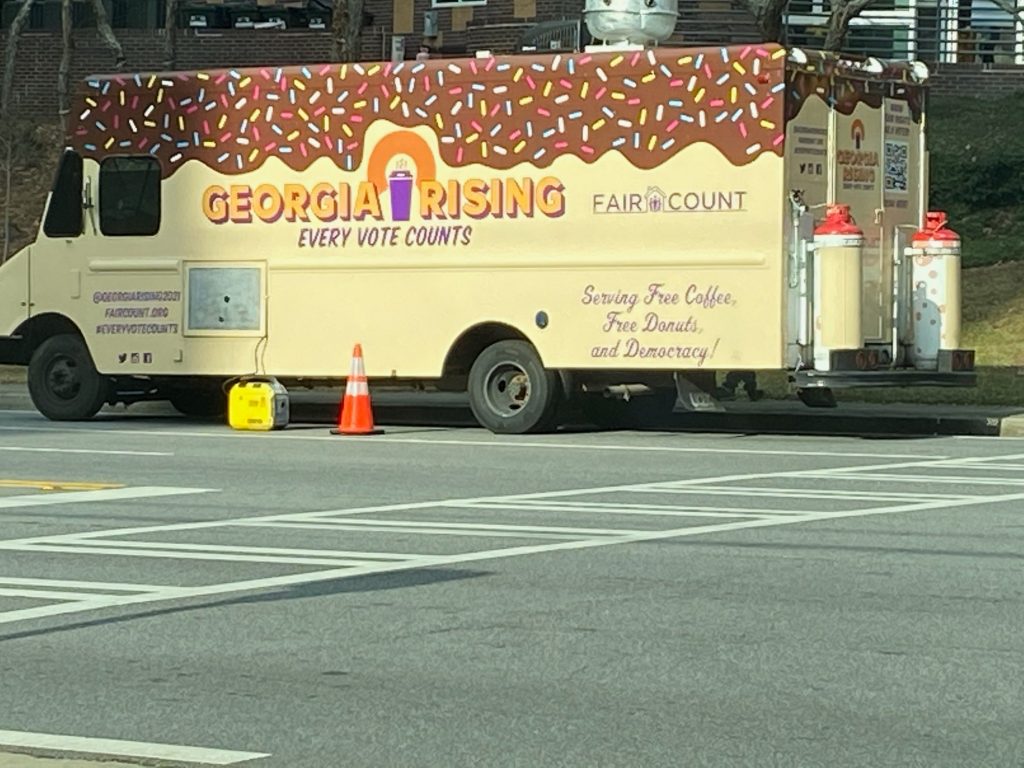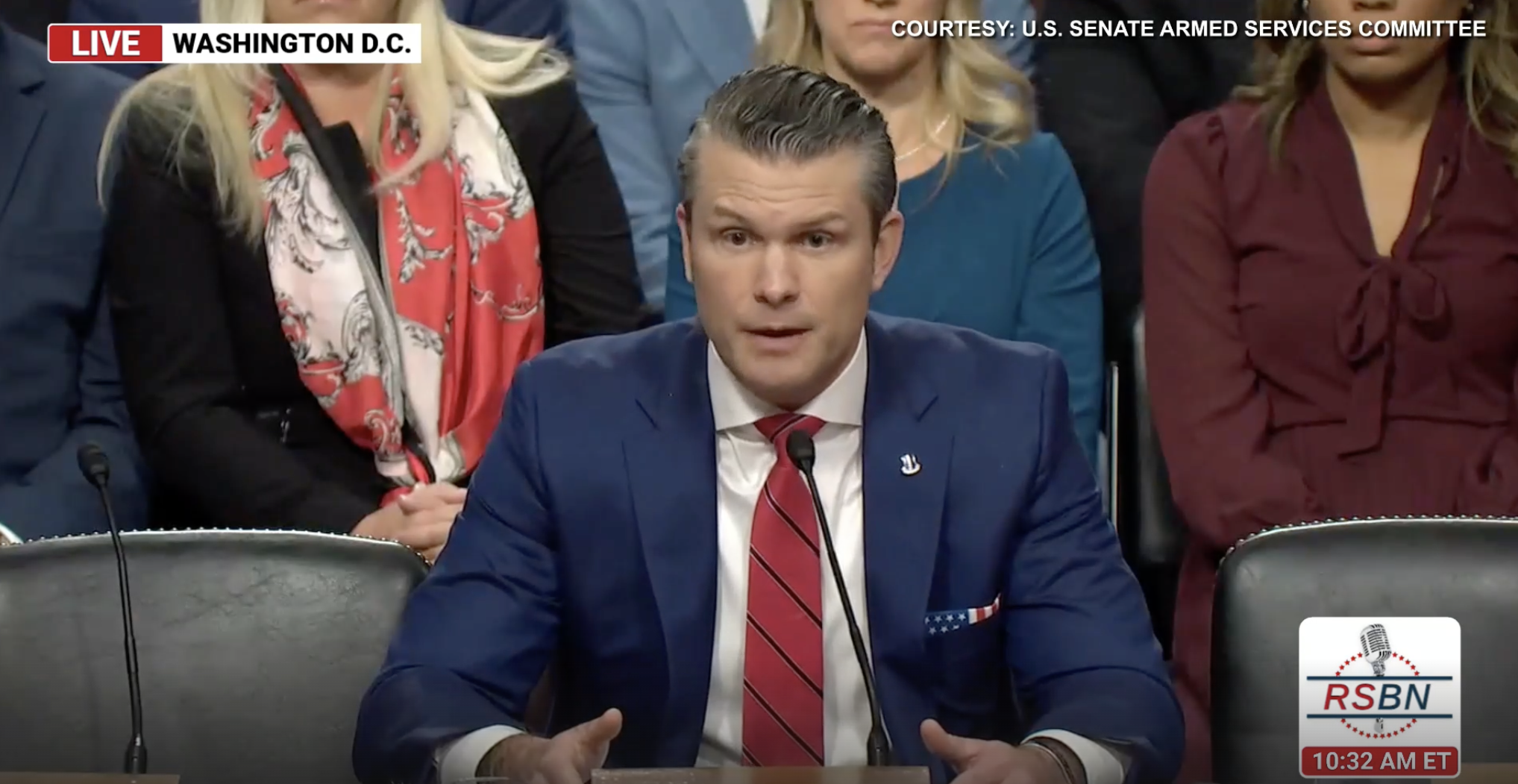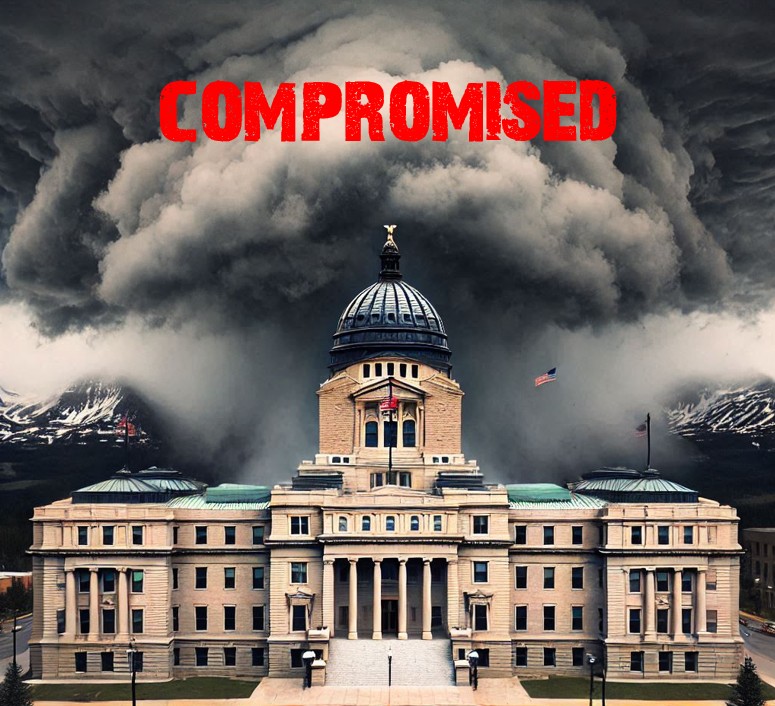Real Time Remedies Are Required

Please Follow us on Gab, Parler, Minds, Telegram, Rumble
Guest Post by Prominent Atlanta Attorney
The 2020 election and runoff put the Georgia Legislature in a hole. They are trying to dig out by new bills to “improve election law.” There are bills on absentee voting, on poll watchers, and holographic ballots. There are bills to introduce a new election Czar into the process – a Deep State person with experience as a poll watcher. There are bills on eligibility, chain of custody, and prohibiting drop boxes. (Hint: They were already prohibited.) An omnibus bill is in the works, supposedly.
But what if the existing election laws had been enforced as written? As written:
Georgia counties would have – monthly -- scrubbed their voter rolls and removed dead voters and persons listed on the national change of address database. Boards of Elections (BoEs) would have removed voters identified as ineligible. Absentee ballot signatures would have been verified and rejected by single poll workers – not subject to the formation of committees under an unconstitutional consent decree.
The supervisors of election (SoEs) would have been less dictatorial in preventing Republican poll watchers from watching – and would not have imposed lifetime bans on poll watchers without due process. Absentee ballots would not have been opened in back rooms before election day. Recounts would have been meaningful and not subject to a top down adjustment. Voters would have been treated equally.
The Dominion Voting Machines might have been reviewed the way that the election officials in Texas reviewed them – and rejected them. Judge Amy Tottenberg’s cautionary statements about those machines in an October ruling would have been heeded, at least to provide a meaningful audit trail.
The Secretary of State reports that the election was fair and conducted in accordance with the Legislative framework. Not many grassroot Republicans believe him. Most voters share that skepticism and many question the integrity of the election laws. We are a long way from restoring confidence.
But confidence is not as easily regained as it is lost. Restoration of trust requires that everyone in the system – the election officials – state and local, the parties, the candidates, election lawyers, and most importantly, the BoEs and the courts – are committed to enforcing the laws as written, enforcing them equally, and providing clarity and transparency.
During the two years leading up to the election, the Democrat party and its affiliates brought a series of lawsuits to increase the chaos in the election system. They challenged the order of the names on the ballots. They challenged the use of a “year of birth” certification on the outer envelopes of mail-in ballots. They challenged the removal of voters from the rolls – even though that process was mandated by federal law – and ineligible names were added back to the rolls – some say as many as 700,000 names were added that were ineligible. Many of those voted.
The “Coalition for Good Governance” sued to change the date of elections, to dispute the use of touchscreens, to challenge all machine voting, to open early voting on weekends, to permit curbside voting, to provide for mobile “pop-up” voting polls, to challenge the electronic “PollPads,” to provide for more PPE during Covid, to provide for elector oaths to be given orally at polling stations (instead of making the voters sign in with the required signature).
In a 66-page complaint filed by the “New Georgia Project” controlled by Stacey Abrams, the Democrats challenged the time frame for receipt of absentee ballots, the failure to provide pre-paid postage ballot return envelopes (calling the purchase of a stamp a “poll tax”), the ban on “assistance” for non-family members (ballot harvesting), the time frame for registering, requesting, and opening an absentee ballot, and even the Legislature’s use of the word “promptly.”
They threw everything against the wall – partly hoping that something would stick. And partly just to keep up the media narrative of “voter suppression.”
Other states faced the same onslaught. Ken Paxton, the Attorney General of Texas, in bringing suit against Georgia, among other states, noted that “[Texas] had 12 lawsuits … that dealt with mail-in ballots, that dealt with voter certification, that dealt with all types of election issues ….” Texas won its lawsuits; Georgia folded like a cheap suit, entering into consent decrees, accepting court rulings that prevented asking for “year of birth” as identification – and the Legislature even went along with that. But Paxton’s comment highlights that a functioning state government will defend and enforce its own laws.
And when faced with evidence of ineligible voters and voting abuse, Georgia election officials refused to enforce the legislative framework. They feared of lawsuits by the New Georgia Project or the Coalition for Good Governance, or the ACLU, or the NAACP, or a dozen pop-up groups designed to increase the chaos in the election system. The Fulton County Republican Party identified 14,000 ineligible voters in one canvassed area – the Fulton County BoE refused to hold a hearing to consider the evidence.
Other county BoEs were threatened with lawsuits by the NAACP and ACLU if they even held a hearing and refused to hold hearings to clean up the rolls. Two counties that did – Muscogee and Ben Hill – held a hearing, were sued by the New Georgia Project (formed by Stacey Abrams), and were forced to recant by a Federal judge (Stacey Abrams’s sister). The rolls have still not been purged of dead, ineligible, double-registrered, and out-of-state voters. BoEs have also refused to hold hearings on issues of voter fraud, improper dropboxes, and other election issues.
Not only have the state election officials refused to enforce the law as written, they have vigorously opposed public oversight. When one voter asked for open records as to why absentee ballot requests were being sent for persons who did not live at her house – even when she had them removed from the rolls earlier – she was told she could not get documents because her request related to “pending litigation.” Other open records requests to the Secretary of State have gone unanswered for weeks and months.
Keep The Truth Bombs Coming From CDMedia! Donate!
State officials have refused to take action to prevent persons providing “gifts” to voters – a customized paint job with New Georgia Project slogans and hashtags was found on a food truck parked outside numerous voting locations – the focal point for campaign stops and political rallies, providing free coffee and doughnuts – all in violation of state law. Whatever entities paid for the food truck and the custom paint job conspired to violate state law – a 10 year felony. No one has been investigated.
Even when double voting was encountered – as in the 2020 primary, when more than 1,000 voters voted twice (according to the Secretary of State), no enforcement actions were brought. The State Board of Elections is now frantically holding meetings to clean up the backlog of cases that have been brought – some going back to 2015 and before. The one thing that is not being discussed is bringing in an outside auditor – an auditor with power to audit the voting machines, the ballots, and the signatures.
The courts have been a disappointment to many voters who expected they would be treated equally. A lawsuit brought in the Fulton County case referenced above sought to force the BoE to hold a meeting and hear the evidence – it was dismissed. Even though an emergency appeal was sought before the election, the appellate court did not docket the case for hearing until more than a month after the November election.
The courts have also used standing, laches and sovereign immunity to keep the evidence from being heard. Courts have denied standing to the President, to Electoral College electors, to candidates, to state parties, to county parties, and to voters. The Supreme Court denied standing to the State of Texas. What does a litigant have to do to get evidence in a case?
Judge Steven Grimberg – a Trump appointee, but with experience with the Secretary of State and its lawyers – denied standing to a voter despite Supreme Court precedent. The judge, supporting the legal milieu of state government, could have ended the case by denying standing, but went further and ruled in dicta on the merits, holding that the unequal treatment occasioned by the lack of compliance with the State legislative framework was nonetheless “consistent with state law” and simply added an “additional safeguard” to ensure “consistency” among the counties. But the Legislature did not mandate consistency among the counties, just that County election officials had the power to recognize mismatched signaturest.
It is not that the judges are not capable of understanding the Constitution or the law. It is not that they could not have observed – if they wanted – that the change of process in the Legislative framework had a statistically significant outcome on the election. It is not that they could not have shut down the dropboxes or the unlawful time periods for receiving absentee ballots.
It is that they want to get rid of the case – they just don’t want to have to make a hard decision. Whether apocryphal or real, the Supreme Court could rightly be viewed as not wanting to take an election case until Donald Trump was clearly out of office. The results of such judicial delay are, as always, tragic.
So what is the good of changing the law if the law is not going to be enforced as written? What is the good in changing the law if the BoEs are not going to hear the evidence? What is the good in changing the law if the SoEs are going to impose “lifetime bans” on Republican volunteers who have challenged a process – as they are supposed to do? What is the good in changing the law if there is no standing, and the courts will not enforce the law as written?
If the Legislature is serious about changing the law, it should focus on broad standing and speedy remedies in election law issues. Cases should not drag on for years only to have decisions on the cusp of elections holding that the case is not “ripe” for adjudication – and then holding two weeks after the election that the case is barred by “laches” for undue delay. Courts should be charged with 24 hour turnaround in all cases – they can do it. The Legislature should provide for a permanent standing committee to defend the Legislature’s position to the court. The Legislature should provide for meaningful and serious penalties for SoEs and other government officials who run amok with power. And the Legislature should provide for a meaningful audit of all election processes – an audit by an independent certified public accounting firm. You know, like they kind they use for a beauty pageant or the Academy Awards.
Yes, the Georgia Legislature is in a hole. But they need to remember the first rule of holes – when you find yourself in one, stop digging.

























This excellent article tells you the "why" and the "what" but doesn't explain the "how" necessary to fix the present situation.
The sad truth is that fascists are now in control of our election apparati in much of the United States -- enough to fix the results to their liking in many of the states and the entire federal level.
Debate, discussion and political process are now obsolete in this country, at least as far as affecting policy and leadership -- they are irrelevant because choosing outcomes will never again be options for the general population.
The fascists have worked systematically for many decades to reach this point. Do you really think they are just going to roll over and surrender their hard-fought gains now that they're finally achieving their goal? In fact, we are now entering a phase of even stricter oppression as they consolidate and crystallize their power to make their dominance absolute and irrevocable.
I swear to you that I am not advocating violence here. But I cannot lie about where we now find ourselves. What I am saying is that it is my opinion that things have reached the point where good old traditional constitutional representative government can only be re-established in these United States by physical expulsion of the fascists that have stolen it.
The choice for the people is either a constitutional republic or the fascist oligarchy now in power.
They need to harden the vote machines and disable any features that were designed to facilitate fraud, or better yet, get rid of them altogether. They also need to fire all of the corrupt election supervisors and any corrupt employees. Like Brenda Snipes in Florida.
If they won't uphold and enforce current law, what difference will changing the law do? Our government has become lawless: the law is only for us governed, not for the governing class. They may pass all kinds of laws in a grand show of "doing something", laws guaranteed to enforce stricter controls on us while being blatantly ignored by them.
Yeah Right...The horse is outta the barn folks......NO FIXING ANYTHING when the criminals are in charge.
What they need to do is put some BITE into the laws. Insert stiff penalties for violating the law. Don't just write the law but make it a crime to violate the law. Right now who has been punished for breaking the law? Nobody!!!!
We do have options. Demand letter to force BoEofficials to provide unscannable paper ballots- the hand marked- hand tabulated kind.
Until you have moral and honest people conducting every position in the election administration, at the polls, through the conduit to the state election office, you cannot have an honest election. Not with the people who are currently doing it. They were positioned and groomed to do the bidding of the Dem party. It's not like they have a tattoo that says so, you know.
The election laws are obviously only considered or followed by moral people.
Brad Carver’s committee with Ga House Affairs put together a list of sound suggestions for restoring election integrity. Getting rid of Dominion was on that list. Yesterday at GOP breakfast meeting in Dekalb County, they spoke to every topic related to election integrity except for dumping Dominion. When we asked about it, he said Dominion isn’t going anywhere. That was an unfortunate response, now we know our vote will never count. I have tried to hang in there with the GOP, but we need to either hijack it or destroy it. There are empty suits. This unapologetic patriot sees no other path than secession. We are too divided to ever unite again. The communists and patriots should just plot the country in half among themselves and call it a day.
Impressive article by the CD Media staff in defense of an honest and lawful American election in Georgia of all places.
Cannot anyone state the obvious? Yes everyone a US citizen of age can vote. I learned a lot of what I suspected about Fulton County where I lived for 2 years
Should they? No absolutely not, not eveyone has a basic understanding of what the elections are for, some are illiterate, many ill informed. Elections should not be easy as going to a "Stop & Go or signing a Shop Mart flyer for a lottery prize.
The New Georgia Project or the Coalition for Good Governance, sounds like Maoist comissars.
It is a civic and deeply personal responsibility. The duty to county is to vote one's conscience not what others induce you to do. Without force or coertion although one can acusethe media of it.
They challenged the order of the names on the ballots? The last election had ballots listing the Democratic frontrunners on the top withthe first check box.
"The failure to provide pre-paid postage ballot return envelopes,": Want to know soemthing really sad? Many younger folks do not know what to do with a stamp much less where to purchase one for the envelope.
"“promptly.” What does that mean.
"Laches"is a "lack of diligence and activity in making a legal claim, or moving forward with legal enforcement of a right, particularly in regard to equity."{wiki}
Power should not reside in the hands of the supervisors/boards of election. The "power" should reside in our greivances againt their imposition of partisan favor.
Suggestions:
*Keep at it with the inqireies and requests for hearings with the Boards of Electors, public ones are allways best.
*Mailers to the public axplaining the 'hijacking of our elections, and door to door 'canvasing / registering / educating.
*Neutral election watchers (Countries overseas have offered this service including a few from Africa and Asia.
*A non-partisan election "cleaners" insuring propriety and focus from all parties. Our elections are not secret ballots counted in the middle of the night.
*Banning of 'gifts and money for "the vote". Banning of ellectioneers and bodygaurd type enforcers coming in from other cities.
*Allow a unifromed police presence at the polls to ensure no outside interference on the voters lines. (No campaigning within 50 meters of poll site.
*Absolutely not! No never paper mail in ballots or drop boxes. What do you think this is a gift lottery? Absentee ballots are good as always.
*Same day in-person voting, Voting is something you are passionate about wanting to do, with collection of absentee ballots those that have arrived "promptly" only from 6am to 9pm, then poll closes, no more voting no more excuses. Any ballots coming in after are discarded. Counting up to 1 hour after.
*Poll observers from all parties, unmolested and without assault, untill count is over.
*This is important: retain the pull down levered old fashioned machines, they work great and are not easy to manipulate.
*Paper ballots in the polling center (as an in house back-up) with proper signature and double ID ok>